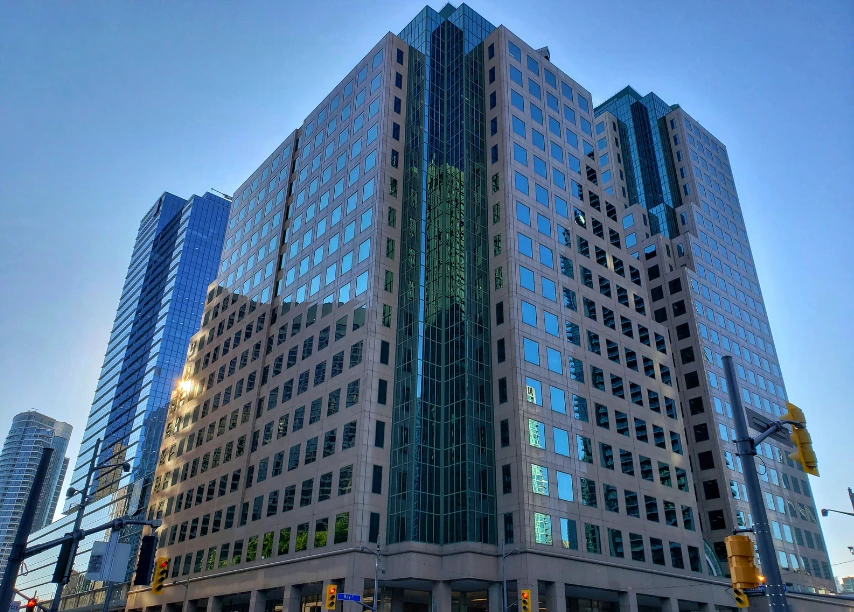Flexible commercial loans for every dream.

With commercial real estate at an all-time high, owning your place of business is a clever investment that provides stability and control, as well as the potential for long-term appreciation and equity growth. Businesses can secure a commercial mortgage to take advantage of these benefits and establish a solid foundation for growth and success. Whether you are looking to purchase new property, expand your current operations, or refinance your existing commercial debts, understanding how commercial mortgages work is crucial in order to get the right funding for your commercial financing needs. At Uptown, our team of experts specialize in providing tailored commercial mortgage solutions and will guide you through the process to get you approved quickly with competitive rates and flexible terms.
Commercial Real Estate
When securing a commercial mortgage, identifying the type of property being financed is essential. Commercial real estate includes a variety of properties used for business operations, investments, and income generation. Below are some of the most common types of commercial properties:
1. Office Buildings
Designed for professional use, office buildings provide space for businesses such as law firms, financial institutions, and technology companies.
Class A: High-end office spaces in prime business districts,
featuring modern design, premium amenities, and top-tier tenant appeal.
Class B: Well-maintained buildings in accessible areas but with fewer high-end features.
Class C: Older buildings that may require upgrades, often located in secondary markets.
2. Retail Properties
Retail spaces accommodate businesses that sell goods or services directly to consumers. These properties are often located in high-visibility areas to attract foot traffic.
Example:
- Standalone retail outlets
- Community shopping centers
- Boutique storefronts
- Food and beverage establishments, including cafés and restaurants
3. Industrial Properties
Industrial real estate supports manufacturing, logistics, warehousing, and distribution operations. These spaces are designed to facilitate large-scale production and storage needs.
Example:
- Fulfillment and logistics hubs
- Manufacturing plants
- Research and innovation centers
- Storage and supply chain warehouses
4. Multifamily Properties
Residential buildings with multiple units intended for rental income. These properties provide investment opportunities through both short-term and long-term leasing.
Example:
- Apartment towers and mid-rise complexes
- Townhome rental communities
- Multi-unit dwellings such as duplexes and triplexes
- Mixed-use properties with residential and commercial spaces
5. Hospitality Properties
Hospitality real estate includes lodging, travel accommodations, and entertainment venues that cater to short-term and extended stays.
Example:
- Boutique hotels and large resorts
- Bed-and-breakfast properties
- Extended-stay lodgings
- Vacation rentals and serviced apartments
6. Special Purpose Properties
These properties are built for specific functions and are often not easily repurposed for other uses.
Example:
- Performing arts venues and theaters
- Event and convention centers
- Religious institutions
- Recreational facilities, such as amusement parks
- Educational buildings, including schools and training centers

a Commercial Mortgage
Securing a commercial mortgage requires meeting specific criteria set by lenders. Several factors influence eligibility, including financial history, property type, and overall business stability. Below are key elements that lenders assess when evaluating commercial mortgage applications:
Strong Credit History
Property Type
Down Payment
Debt Service Coverage Ratio (DSCR)
Lenders evaluate Debt Service Coverage Ratio (DSCR) to ensure the property generates enough income to cover loan payments. A DSCR of 1.25 or higher is typically required, meaning the net operating income must exceed mortgage payments by at least 25%.
Personal Financial Statement
Lenders may request a personal financial statement to assess overall financial stability. This document outlines assets, liabilities, and net worth, providing insight into the borrower’s financial strength. A well-prepared statement can enhance loan approval prospects
Business Plan
Property Appraisal
Commercial Property Insurance
Insuring commercial property is more complex than residential properties. The Canada Mortgage and Housing Corporation (CMHC) does not insure fully commercial properties but
may cover mixed-use buildings with at least 15% down payment. Lenders require security to mitigate the risks associated with commercial properties, especially since borrowers may declare bankruptcy if business operations are not profitable.


Flexible Loan Terms
Commercial mortgage lenders provide adaptable financing options to suit the needs of businesses and investors. These may include interest-only payments, extended amortization periods, and adjustable rates to enhance affordability.
Benefit: Flexible loan terms allow for better cash flow management and can be structured to align repayment with business cycles or project timelines.
Investment Opportunities
Commercial financing enables businesses and investors to explore a broader range of investment opportunities, such as acquiring, renovating, or expanding commercial properties.
Benefit: A well-planned commercial real estate investment can lead to portfolio diversification and higher potential returns.
Building Business Credit
Successfully managing a commercial loan can contribute to establishing and strengthening a company’s credit profile, making future financing more accessible.
Benefit: A strong credit profile improves the ability to negotiate better loan terms, lower interest rates, and increased borrowing capacity.
Tax Advantages
Interest paid on a commercial mortgage is often tax-deductible, creating opportunities for significant cost savings.
Benefit: Tax benefits can enhance the overall profitability of an investment while improving cash flow.
Equity Growth
Owning commercial real estate provides the potential for equity appreciation as property values increase over time.
Benefit: Accumulated equity can be leveraged for future investments or reinvested into business growth and financial stability.
Consistent Income Stream
Commercial properties, particularly those with long-term lease agreements, can provide a steady and predictable source of income.
Benefit: A reliable income stream simplifies financial planning and supports long-term business stability.
Rental Income Potential
Property ownership presents the opportunity to generate additional revenue by leasing out available space—whether office units, parking spaces, or storage facilities.
Benefit: Rental income can supplement business revenue and help offset mortgage expenses.
Converting Rent into Equity
For business owners who currently lease space, transitioning to property ownership eliminates the issue of paying rent without building long-term value.
Benefit: Mortgage payments, often comparable to rental costs, contribute to property ownership and long-term equity growth, creating a stronger financial foundation.
Commercial mortgages are designed to support various business ventures, real estate investments, and financing needs. Each type serves a distinct purpose, offering specific advantages based on the borrower’s requirements.
1. Traditional Commercial Mortgages
A traditional commercial mortgage is the most common type of financing used to purchase or refinance income-generating properties. The loan is secured by the property, with repayment structured through scheduled monthly payments
over a fixed term. Interest rates may be either fixed or variable, depending on the lender and borrower preferences.
When to Consider a Traditional Commercial Mortgage:
- Acquiring office buildings, retail spaces, or industrial facilities
- Financing multi-family residential properties
- Seeking long-term financing with predictable repayment terms
2. CMHC-Insured Mortgages
feature lower interest rates and longer amortization periods, as the insurance reduces lender risk.
When to Consider a CMHC-Insured Mortgage:
- Purchasing or refinancing multi-unit residential properties
- Securing lower interest rates with extended repayment terms
- Developing or revitalizing affordable housing proje
3. Construction Mortgages
Construction mortgages provide short-term financing to support the development or major renovation of commercial properties. Funds are disbursed in phases based on project completion stages and later converted into permanent
financing once construction is complete.
When to Consider a Construction Mortgage:
- Developing new commercial properties
- Renovating or repurposing existing structures
Projects requiring staged financing throughout construction phases
4. Bridge Loans
Bridge loans provide temporary, short-term financing to facilitate real estate transactions while awaiting long-term funding. These loans are commonly used when purchasing a property before selling an existing one or when quick
capital is needed to secure an opportunity.
When to Consider a Bridge Loan:
- Purchasing a new property before completing the sale of another
- Securing fast financing for time-sensitive transactions
- Acquiring properties that require renovations before obtaining long-term financing
5. Private Mortgages
Private commercial mortgages are funded by private lenders rather than traditional financial institutions. These loans typically have shorter terms, higher interest rates, and more flexible approval criteria, making them an option for borrower
s who need quick financing or do not meet conventional lending requirements.
When to Consider a Private Mortgage:
- Seeking financing without meeting traditional lender criteria
- Requiring fast access to capital for urgent transactions
- Exploring short-term funding solutions with flexible terms
6. Mezzanine Financing
Mezzanine financing is a hybrid solution that combines debt and equity financing, often used for commercial real estate development. This form of financing is subordinate to the primary mortgage and carries higher risk, but it allows
businesses to access additional capital beyond their first mortgage.
When to Consider Mezzanine Financing:
- Expanding or developing large-scale commercial projects
- Requiring additional funding beyond the primary lender’s approval
Accepting a higher risk profile in exchange for growth opportunities
7. Asset Financing
Asset financing allows businesses to leverage existing assets, such as equipment, vehicles, or inventory, to secure funding. This type of financing provides access to capital without needing to liquidate valuable business assets, making
it a useful option for companies looking to fund growth, cover operational expenses, or expand operations.
When to Consider Asset Financing:
- Unlocking capital by using business assets as collateral
- Purchasing new equipment or machinery without depleting cash reserves
- Managing cash flow while retaining ownership of critical business assets

Our commercial mortgage solutions feature favorable interest rates, ensuring cost-effective financing that supports business profitability and long-term property growth.
Our financing options offer high loan-to-value ratios, allowing borrowers to access a significant portion of their property’s value for investment or refinancing purposes.
In select cases, we provide non-recourse loan options, ensuring additional security by limiting the borrower’s personal liability in case of default.
We provide customized loan terms to meet the unique needs of commercial borrowers, offering short-term financing from 6 months to long-term solutions extending up to 24 months.
Borrowers have the flexibility to make interest-only payments during the loan term, enabling better cash flow management while allocating funds to other operational priorities.
We offer second-position commercial loans, giving borrowers access to additional capital secured against their property to support expansion and operational needs.
Which Commercial Mortgage is right for you?
Regardless of your financial situation or unique needs, we will help you secure the financing required to support the growth of your business with a Commercial Mortgage.
FAQ
Commercial mortgages can be used to finance a wide range of property types, including office buildings, retail spaces, industrial properties, multi-family units, and mixed-use developments.
Typical documentation includes business financial statements, tax returns, a business plan, property details, income projections, and a credit history of the business and its principals.
Commercial mortgages are specifically for properties used for business purposes and often involve different underwriting criteria, terms, and rates compared to residential mortgages. The assessment focuses more on the asset class, income, expenses, and the borrower’s ability to service the loan.
Interest rates are influenced by factors such as the type of property, loan amount, loan term, creditworthiness of the borrower, and current market conditions.
Yes, refinancing is an option to improve terms, access equity, or adjust the loan to better fit your current financial situation. Contact us to explore refinancing opportunities.
While having strong credit improves your chances of approval, borrowers with less- than-perfect credit may still secure a commercial mortgage. Lenders may consider alternative factors such as the property’s value, business financials, and overall investment potential. In some cases, private or alternative lenders offer financing solutions for those with lower credit scores, often at higher interest rates.
Down payment requirements vary based on property type, lender policies, and borrower profile. Generally, commercial mortgages require 20% to 35% down, though some lenders may offer lower down payment options for owner-occupied properties or CMHC- insured loans. Larger down payments can lead to better interest rates and financing terms.
Commercial mortgage terms typically range from 5 to 25 years, depending on the lender and loan structure. Some financing options, such as bridge or construction loans, may have shorter terms, while long-term investment properties may qualify for extended amortization periods.
Yes, commercial mortgage rates tend to be higher than residential rates due to increased risk, larger loan amounts, and longer repayment terms. However, factors like property type, borrower financials, loan structure, and lender type all influence the final rate. Working with an experienced mortgage broker can help secure the most competitive rate available.
Yes, most lenders require a property appraisal to determine its market value and ensure it serves as adequate collateral. Appraisals are crucial in assessing risk, determining loan amounts, and validating the investment potential of the property.
Residential mortgages are available for small multi-unit residential properties, typically up to four units. Larger multi-unit buildings and all other commercial properties, such as office spaces, retail buildings, or industrial facilities, require commercial financing. A mortgage broker can help explore the best loan options based on property classification and investment goals.
There is no set minimum credit score for commercial mortgages, but most lenders prefer a score above 700 to demonstrate strong financial management. Alternative lenders may work with lower credit scores, though this often results in higher interest rates and stricter loan terms.
Get Your Free Estimation
